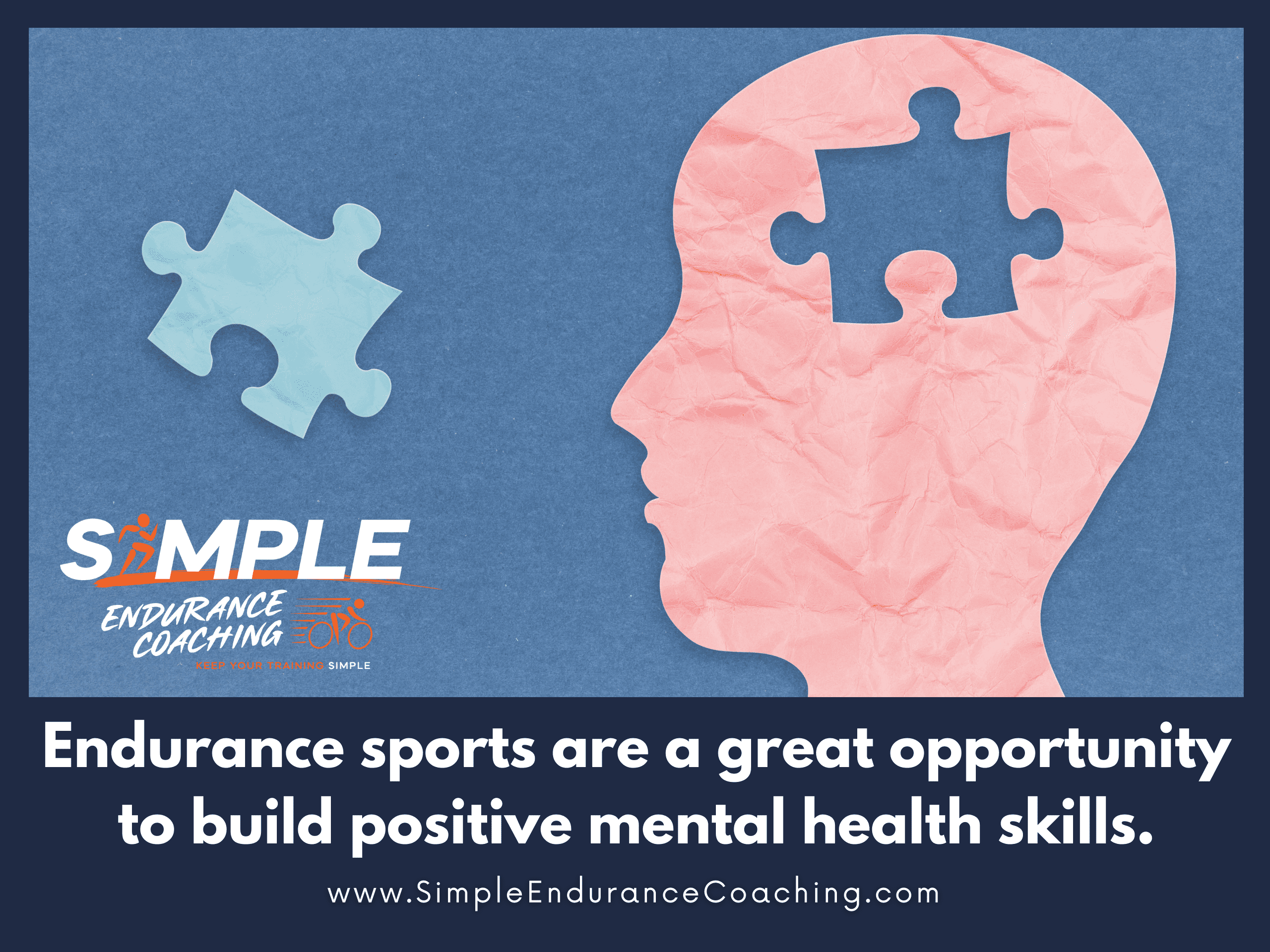Endurance Sports Are A Great Opportunity To Build Positive Mental Health Skills

Mental health can play a crucial role in an athlete’s overall well-being, performance, and enjoyment of endurance sports.
Whether you’re an everyday long-distance runner, gravel cyclist, triathlon, or other endurance sport participant, understanding the link between our sports and mental health can open up a world of opportunities for personal growth and positive transformation.
In this blog post, we’ll explore how endurance sports can help build strong mental health foundations and navigate some of the unique challenges that athletes may face along their journey.
These mental health skills are critical in my coaching business to help clients improve their performance – in whatever way they define success.
What is mental health in endurance sports?
When we talk about mental health in the context of endurance sports, we are referring to an individual’s psychological and emotional well-being as it relates to their participation and performance in these demanding activities.
It encompasses skills such as resilience, focus, motivation, self-confidence, and overall mental toughness.
We’ll talk more about how we can improve and build on these skills later.
What are some ways endurance sports can build mental health?
Endurance sports offer a multitude of ways to build and enhance mental health, including:
- Development of resilience. Participating in endurance sports requires pushing your limits, facing physical and mental challenges, and persevering through difficult moments. This process builds resilience by teaching you how to bounce back from setbacks and overcome obstacles like when doing interval sessions.
- Stress reduction. Engaging in physical activity releases endorphins, which are natural mood enhancers that help reduce stress levels. Regular exercise also improves sleep quality, reduces anxiety, and increases self-confidence – all contributing factors to positive mental well-being.
- Mindfulness practice. Whether it’s focusing on your breathing during a long run or staying present during a challenging climb, these activities allow you to be fully immersed in the present moment. This helps calm the mind, improve focus, and cultivate a sense of inner peace.
- Goal-setting skills. Setting realistic yet challenging goals provides motivation and direction for training sessions and races alike. Accomplishing these goals boosts self-esteem and instills a sense of achievement – key components of good mental health.
- Opportunities for social connection within communities or teams. Being part of such networks offers support systems where athletes can share experiences, seek advice or encouragement when needed – improving overall well-being through social interactions.
- Improved cognitive function including memory retention as well as increased creativity- both essential aspects for maintaining healthy minds!
What are some mental health challenges endurance sports cause in athletes?
In addition to the numerous benefits that endurance sports can have on mental health, it is important to acknowledge that there are also some challenges that athletes may face.
While participating in these demanding activities, athletes may experience certain mental health challenges that require attention and care.- One of the main challenges is burnout. The intense physical and mental demands of endurance sports can sometimes lead to feelings of exhaustion and a feeling of being overwhelmed. Pushing oneself too hard without adequate rest or recovery can result in burnout, which can negatively impact both physical performance and mental well-being.
- Another challenge is the pressure to perform at a high level consistently. Athletes often set goals for themselves and strive for improvement in their sport. This drive for success can create immense pressure and stress, leading to anxiety or even depression if not managed properly.
- Moreover, injuries are common in endurance sports due to their physically demanding nature. Sustaining an injury can be mentally challenging as it disrupts an athlete’s training routine and progress towards their goals. It may also trigger feelings of frustration, disappointment, or even fear about returning to the sport after recovery.
- Additionally, comparison with others can affect an athlete’s mental health negatively. In today’s age of social media where athletes share their achievements online, it becomes easy for individuals to compare themselves unfavorably with others who might appear more successful or accomplished. This comparison game could contribute to feelings of inadequacy or self-doubt.
How should everyday endurance athletes address these challenges?
To address these challenges effectively, athletes should prioritize self-care strategies such as setting realistic goals, maintaining a balanced training schedule with ample rest periods, seeking support from coaches or mentors who understand the psychological aspects of endurance sports, practicing mindfulness techniques like meditation or visualization exercises, and fostering strong social connections within the sporting community.
Endurance sports require not only physical strength but also a certain level of mental fortitude.
Athletes may face numerous challenges during training and competitions – from pushing through fatigue and pain to managing self-doubt and overcoming obstacles along the way.How can we take care of our mental health?
Having good mental health in endurance sports means being able to maintain a positive mindset despite setbacks or difficulties.
It involves developing coping mechanisms for stress management, staying motivated when facing adversity, and maintaining a healthy balance between training commitments and other areas of life.
Mental health in endurance sports is not just about avoiding negative emotions; it’s also about cultivating positive ones.
This includes experiencing joy while engaging in physical activity, feeling a sense of accomplishment with each milestone reached or personal best achieved, and finding fulfillment through the journey itself rather than solely focusing on the end goal.
In essence, mental health in endurance sports is about fostering inner strength that allows athletes to perform at their best physically while also nurturing their overall well-being.
By taking care of their minds as much as they do their bodies, athletes can unlock new levels of potential both on and off the race course or trail.What are signs of poor mental health in endurance sports?
Signs of poor mental health in endurance sports can manifest in various ways.
- One common sign is a noticeable decline in motivation and enjoyment of the sport. Athletes may find themselves lacking the drive to train or compete, which can be a stark contrast to their previous enthusiasm.
- Another sign is an increase in anxiety and stress levels. Endurance sports often push athletes out of their comfort zones physically and mentally, leading to heightened feelings of pressure and worry. This can lead to excessive self-doubt, fear of failure, and difficulty managing pre-race nerves.
- Poor mental health can also manifest as changes in sleep patterns. Insomnia or restless nights are not uncommon for athletes experiencing high levels of stress or anxiety related to their performance.
- Additionally, social withdrawal may occur when individuals are struggling with their mental health in endurance sports. They may isolate themselves from teammates or training partners due to feelings of inadequacy or a lack of confidence.
- Prolonged periods of low mood or persistent feelings of sadness should not be ignored. Depression can impact an athlete’s ability to perform at their best and hinder overall well-being.
It’s important for athletes and those around them to recognize these signs early on so that appropriate support systems can be put into place.
What are some key mental skills in endurance sports?
In the world of endurance sports, mental skills play a crucial role in determining an athlete’s success.
These skills are not only important for physical performance but also for maintaining positive mental health.
Here are five you can learn and practice during endurance sports:- Resilience. Endurance sports require athletes to push through physical and mental barriers, and having the ability to bounce back from setbacks is essential. Resilient athletes can adapt to challenges, stay focused on their goals, and keep pushing forward even when things get tough. You can practice this kind of toughness in training to prepare for challenging races.
- Concentration. In long-distance races or events, it’s easy for distractions to creep in and throw an athlete off track. Maintaining focus amidst fatigue or external stimuli is crucial for optimal performance. Focusing on your breathing or “chunking” your time in blocks can help you manage your focus.
- Self-belief. Athletes must have confidence in their abilities and trust the training they have put in. This unwavering belief gives them the motivation needed to persevere through grueling workouts or competitions. This is something else to practice during training. You can give yourself positive messages through self-talk to help your belief in yourself.
- Endurance sports also demand strong goal-setting skills. Athletes need clear objectives that provide direction and purpose during training sessions or races. Goals need to be realistic and in your control. Setting a goal of getting a top 5 at cyclocross nationals is often out of your control. Getting all your equipment and training dialed in before the race, for example, is something you can manage.
- Effective stress management techniques are essential for maintaining good mental health while participating in endurance sports. Stress can be both motivating and detrimental; therefore finding healthy coping mechanisms like meditation or deep breathing exercises can help athletes manage anxiety levels effectively. Sleep, yoga, and mindfulness practice can all help with managing stress.
Here are three things everyday athletes can learn about mental health and endurance sports:
- Training time is a great time to practice mental skills like resilience and concentration.
- Non-training time is a good time to work on good recovery and mindfulness techniques like yoga.
- Sleep and nutrition form the basis of all good mental health practices.
Need more?
Get a free Core Strength and Stability training video when you opt-in to receive my weekly blog posts about what works in endurance sports.
Sign up for Virtual Coffee so we can discuss your goals, ask questions, and talk about making your endurance training more effective, fun, and Simple.
Paul Warloski is a:
- USA Cycling Level 2 Coach
- RRCA Running Coach
- Training Peaks Level 2 Coach
- RYT-200 Yoga Instructor
- Certified Personal Trainer




